| Dr. Becki Maldonado graduated from the University of Oklahoma with her doctorate in Instructional Leadership and Academic Curriculum with a focus on English Education. She is a committee member of the Orbis Pictus Award for Outstanding Nonfiction for Children. Her scholarship and research focus on arts integration, nonfiction text, text selection, and developing and exercising teachers’ critical consciousness, along with the use of critical dialogue to develop social awareness in education and the community. She is also the editor of Arts Integration and Young Adult Literature: Enhancing Academic Skills and Student Voice and Increasing Visual Literacy and Critical Thinking Skills Through Graphic Novels. |
As for formal education about Antarctica or any creature that lived on or around Antarctica, I learned that Antarctica was one of the seven continents, but that was it. In third grade, my teacher had a penguin race for learning your multiplication tables. We colored our penguins, and every time we could tell her one number of multiplication facts, we then could move our penguin to the next number. I can remember how fun it was at the time. My mom probably still has my third grade multiplication penguin somewhere.
As an educator when I reflect back on my childhood, I find it concerning that (1) I was as content as could be knowing the least amount about Antarctica as possible and (2) no adult ever sparked curiosity in me about Antarctica. No one ever said to me, “Becki I wonder why there is so much ice in Antarctica?” or “Do you think killer whales only eat penguins? What else could they eat?” In defense of the adults in my life, they probably didn’t know the answers and probably were not curious about Antarctica themselves.
Leslie (2014) explains that curiosity is something that is nurtured in a child through the child’s culture. If the culture encourages children to be exploratory, then their curiosity will thrive. If the culture promotes an environment where children are not to question, yet instead to be content receiving the knowledge provided to them, then their curiosity will shrivel like an untended plant. The attitude of being curious is vitally important because from curiosity stems critical thinking (Leslie, 2014).
Anyone who knows me and is reading this is probably thinking, “But Becki you are an explorer of knowledge, who is curious and a critical thinker.” This is true; however, it took a rebellious nature, getting out of my childhood culture, and a lot of unlearning to fully accept my natural explorer mindset and to learn that it is okay to be curious and a critical thinker because in my childhood culture, questioning any adult or any knowledge was bad. If you sought out other knowledge other than what was provided, it meant getting into a lot of trouble. Now as an adult I know we have to do better for the next generation, which as an educator that means helping other educators foster a culture of being an explorer to develop the necessary critical thinking skills to navigate the world.
The Need to Be Curious about Antarctica
Growing up in the 80’s and 90’s, there was very little talk about climate change, even though in 1993 Al Gore did start to begin to use the media to public warn people and the government about the devastating effects to come from climate change in the upcoming decades (Sarlin, 2022). Now 30 years later climate change is more widely understood and accepted, along with being a regular topic in mainstream media and on social media. While there are many different aspects of climate change to study and be involved in, the most difficult to prevent and reverse is the melting of the ice in Antarctica and the melting of the ice in Antarctica is one of the most contributing factors to sea level rise (IPCC, 2023). When people can better understand and connect to Antarctica and how and why the ice is melting, it will allow people to take informed actions about how to help slow the ice melt and to make better necessary decisions about adaptation to sea level rise.
National Geographic’s The Explorer Mindset Framework
In June 2022, National Geographic released “The Explorer’s Mindset” framework. Through this mindset, students will learn develop their attitudes, skills, and knowledge (ASK). Figure 1.1 is part of a PDF provided for free by National Geographic. If you click on the “The Explorer’s Mindset” framework link, scroll about three-fourths of the way to the bottom of the webpage, and in the “Download” section, click on the button that says, “Explorer Mindset Framework.” This will download an eight-page PDF that has easy to read slides with competencies and descriptors.
With climate change being at the forefront of media and social media, students are curious and asking questions about climate change. Being empathetic or not will influence how they respond to the answers they find to their questions. If someone from a non-coastal area is curious about sea level rising, when the student finds out that “Over 410 million people are predicted to be at risk from rising sea levels by 2100” (Masterson and Hall, 2022), their response to that knowledge will depend up their level of empathy. At the same time being curious about climate change is not for the faint of heart and can be overwhelming, sometimes causing climate anxiety. This is why it is important for students to be empowered with the skills and knowledge to know that they can make a difference.
All three attitudes, being curious, empathetic, and empowered, are vitally important to the students’ well being and mental health. Without curiosity, nothing will improve. If they are curious and empowered but lack empathy, it could lead to an imperialism mindset and making decisions that are not in the best interest of other people or nature of the area. If a student is curious and empathetic but is not empowered, they can develop climate anxiety, which can then lead to other mental health issues. When using “The Explorer Mindset” framework, it is important to be mindful of the attitude of the students while exploring new information.
Working Together to Come to a Solution and Take Informed Action
English educators frequently teach the skills of collaboration, thinking critically, and communicating, which is another reason why the Explorer’s Mindset framework is excellent for the English classroom. Let’s take a closer look at the other three skills:
Using geographic practices is where this framework takes a turn towards a more scientific stance. The great thing about citizen science is that there are no degrees necessary to participate; therefore, all people are citizen scientists. There is no way for scientists to collect all the data they need for projects about the planet by themselves. Scientists and massive science research institutes have regular everyday people, like you and I, collect data for them through specified scientific methods usually inputting data through an app or via email. There are even grants available for citizen science projects. If you google “citizen science,” a vast array of projects for every major scientific research institute will appear. The “using geographic practices” also opens up the opportunity to collaborate with other educators who are more familiar with these practices.
Taking informed action is one of the most important parts of the Explorer Mindset framework. So how are your students taking the information they found out and their solution outside of the classroom? In the English classroom, it could look like writing letters to an elected official, creating an art display, making digital story telling posts for social media, putting on a play or having an informative event for the community. The possibilities are endless. Taking informed action gives your students an audience beyond the classroom. This increases the buy in to the project, and it also empowers them to make a difference in the world.
Knowledge and Connections
The skills above will be developed as students begin to acquire knowledge and make connections. English educators are expert knowledge acquirers and connection makers. My two favorite young adult nonfiction books for beginning to study Antarctica are The Call of Antarctica: Exploring and Protecting Earth’s Coldest Continent by Leilani Raashida Henry (2022) and Antarctica: The Melting Continent by Karen Romano Young (2022). Reading both books through a geographical lens will give students a sturdy foundational understanding of the past, the present, and the future of Antarctica.
While Henry (2022) focuses on the history and geographical perspective of Antarctica, Romano Young (2022) hones in on what it is like to do modern research on Antarctica. Romano Young is a polar explorer and highlights current research and scientists, including two tweeting glaciers (@AntarticPIG and @ThwaitesGlacier). This book helps students make connections to the nature of Antarctica and the importance of the scientific research being done in Antarctica.
Gaining More Knowledge and Making More Connections
The two books mentioned above will help students gain a basic geographic perspective of Antarctica. Here are more multimodal resources to help expand their knowledge and make connections:
Expanding Knowledge Resources
- Dr. Steve Emslie. (2023, March). All about Antarctica. https://open.spotify.com/show/0A2BpvLhGngLjH7Lh6yvmR
- NASA. (2023, January 16). Influencing factors: Satellites help decipher the fate of West Antarctica. https://landsat.gsfc.nasa.gov/article/influencing-factors-satellites-help-decipher-the-fate-of-west-Antarctica/
- BBC Earth. (2022). Filming Antarctica’s underwater secrets. https://www.youtube.com/watch?v=BtQhb8sWJNw
- PBS News Hour. (2022). Scientists measure how quickly crucial Antarctica glacier is melting. https://www.youtube.com/watch?v=JvFkLWHRUwo
- Consider This From NPR. (2023, April 19). Why melting ice in Antarctica is a big problem for coastal Texas. https://open.spotify.com/episode/7MOicXkdbtyBsIbB0o0ln6?si=EXFdiddySg2rckLJ9Ns9Eg
- NOAA. (2023). Sea level rise viewer. https://coast.noaa.gov/slr/#/layer/sce/8/-8727403.099684313/4602140.349421124/7/satellite/18/0.8/2050/interHigh/midAccretion
- Blue OceanFilmFest. (2015). Two Min on Oceans w/ Jim Toomey: Adaptation to Sea Level Rise - BLUE 2014: Short Shorts Finalist. https://www.youtube.com/watch?v=gqgGA7XQhJ8
- ABC News. (2022). Can New York City adapt to rapidly rising sea levels?. https://www.youtube.com/watch?v=B1Mn3STcam8
References
Henry, L.R. (2022). The call of Antarctica: Exploring and protecting Earth’s coldest continent.
Twenty-first Century Books.
International Panel on Climate Change (IPCC). (2023). AR6 synthesis report: Climate Change
2023. https://www.ipcc.ch/report/ar6/syr/
Leslie, I. (2014). Curious: The desire to know and why your future depends on it. Basic Books.
Masterson, V. and Hall, S. (2022, September 29). Sea level rise: Everything you need to know.
World Economic Forum.
https://www.weforum.org/agenda/2022/09/rising-sea-levels-global-threat/#:~:text=Over
%20410%20 million%20people%20are,when%20people%20started%20burning%20coal.
National Geographic. (2022). National Geographic explorer mindset framework.
https://www.nationalgeographic.org/education/about/explorer-mindset/
Romano Young, K. (2022). Antarctica: The melting continent. What on Earth Publishing.
Sarlin, B. (2022, July 27). MTP flashback: In 1993, Al Gore warned about climate change as
U.S. temperatures soared. NBC News.
https://www.nbcnews.com/meet-the-press/meetthepressblog/mtp-flashback-1993-al-gore-warned-climate-change-us-temperatures-soare-rcna40221
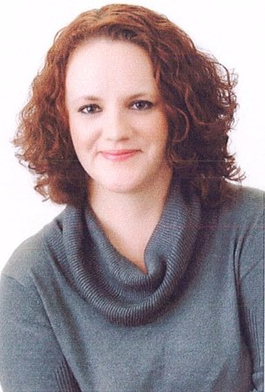
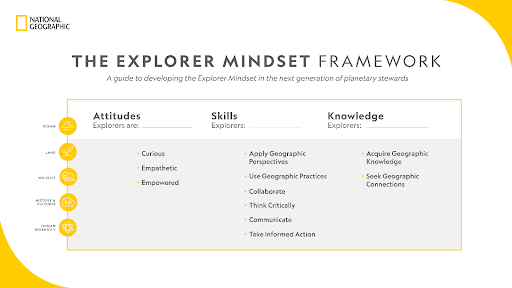
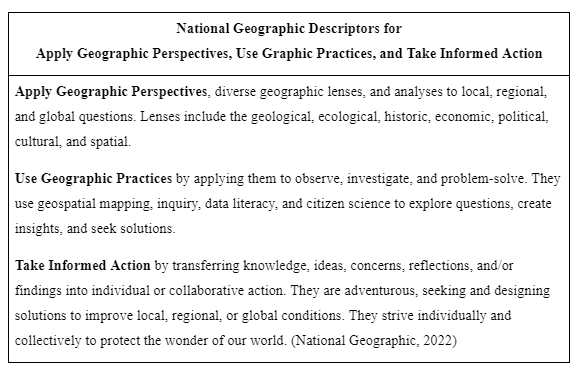
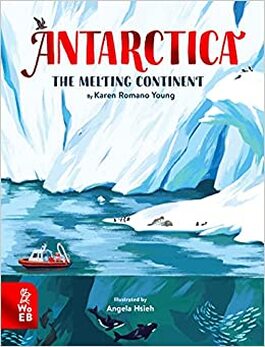
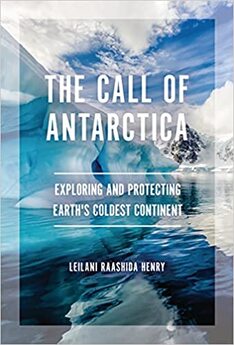

 RSS Feed
RSS Feed